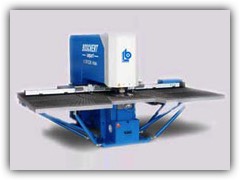

Toll Free: (888) 218-2260
Phone: (570) 668-0320
Fax: (570) 668-5093
Email: sales@remalymfg.com
Toll Free: (888) 218-2260
Phone: (570) 668-0320
Fax: (570) 668-5093
Email: sales@remalymfg.com
CNC Machining Services
Request Information
Introduction to CNC Machining
CNC machining is a manufacturing process that utilizes computer-controlled machines to produce complex and precise parts or components from various materials. CNC stands for Computer Numerical Control, which refers to the software used to program the machines. CNC machining has become essential to modern manufacturing due to its precision, efficiency, and versatility.
The origins of CNC machining can be traced back to the 1940s when the U.S. Air Force developed a system to control the movements of machine tools using punched tape. However, it was in the 1970s that the technology became more widely available and affordable, leading to its widespread adoption in manufacturing. In the decades since, CNC machining has continued to evolve, with advancements in software, hardware, and automation leading to increased precision, efficiency, and versatility.
Today, CNC machining has become a critical component of modern manufacturing due to its numerous advantages over traditional manufacturing methods. These include increased precision, consistency, and efficiency, which can lead to cost and time savings. Additionally, CNC machining allows for producing complex geometries and shapes that would be difficult or impossible to achieve using conventional methods.
CNC Machining Process
CNC machining involves a series of steps, including design and programming, material preparation, CNC machine setup, machining operation, and post-processing. Each step ensures the final product meets the required specifications and quality standards.
Design and Programming
The first step in CNC machining is designing the part or component that needs to be produced. This is typically done using computer-aided design (CAD) software. Once the design is complete, the next step is programming the CNC machine to execute the desired task. This involves creating a set of instructions, known as G-code, that tells the machine how to move the cutting tool along the designated path.
Material Preparation
The next step is preparing the material that will be used to produce the part or component. This involves selecting the appropriate material, such as metal or plastic, and ensuring it is properly secured in the machine. Then, the material is typically cut or shaped to the appropriate size and shape before being loaded into the CNC machine.
CNC Machine Setup
Once the material is prepared, the next step is setting up the CNC machine. This involves loading the G-code program into the machine, selecting the appropriate cutting tool, and setting the machine's parameters, such as speed and feed rate. The machine is then calibrated to ensure it is properly aligned and ready to begin machining.
Machining Operation
The machining operation is where the material's actual cutting and shaping occur. The CNC machine follows the programmed instructions to move the cutting tool along the designated path, removing material from the workpiece to create the desired shape and size. The machine's sensors monitor the cutting process to ensure it is progressing as planned and that the finished product meets the required specifications.
Post-Processing
The final step in CNC machining is post-processing, which involves finishing the part or component to ensure it meets the required specifications and quality standards. This may involve processes such as deburring, polishing, or coating. Finally, the finished product is inspected to ensure it meets the required standards before being sent for assembly or use.
The CNC machining process is a precise and intricate operation that involves several essential steps. From design and programming to post-processing, every stage of the process requires careful attention to detail to achieve high-quality parts and components. Overall, the CNC machining process is a critical tool for manufacturing high-quality parts and components, with each step requiring careful attention to detail to achieve the desired outcome.
Types of CNC Machines
Several types of CNC machines are used in various industries to produce high-quality parts and components. The most common CNC machines include CNC milling machines, lathes, plasma cutters, and routers.
CNC Milling Machines
CNC milling machines cut and shape materials, such as metal or plastic, into various shapes and sizes. They use a rotating cutting tool to remove material from the workpiece, creating complex high-precision shapes. CNC milling machines can be used for various applications, including prototyping, tool and die manufacturing, and production runs.
CNC Lathes
CNC lathes are used to cut and shape materials, such as metal or wood, into cylindrical shapes. They utilize a rotating cutting tool that moves along the workpiece's length, creating high-precision symmetrical shapes. CNC lathes can be used for a wide range of applications, including machining engine parts, valves, and shafts.
CNC Plasma Cutters
CNC plasma cutters cut materials like metal into various shapes and sizes. They utilize a plasma torch that generates a high-temperature plasma arc, which melts the material and cuts it into the desired shape. CNC plasma cutters can be used for a wide range of applications, including cutting metal sheets, pipes, and tubes.
CNC Routers
CNC routers cut and shape materials like wood or plastic into various shapes and sizes. They utilize a rotating cutting tool that moves along the x, y, and z axes, creating high-precision complex shapes. CNC routers can be used for various applications, including cabinetry, signage, and prototyping.
The type of CNC machine utilized in manufacturing depends on several factors, including the type of material being worked with, the required precision and accuracy, and the desired shape and size of the part or component. CNC machines have transformed the manufacturing industry through their advanced software and hardware, enabling manufacturers to produce high-quality parts and components with greater efficiency and consistency. Overall, selecting the appropriate type of CNC machine is critical to ensuring the efficient and cost-effective production of high-quality parts and components in various industries.
Advantages of CNC Machining
CNC machining has several advantages over traditional manufacturing methods, making it an essential tool for producing high-quality parts and components in various industries. Some of the main advantages of CNC machining include precision and accuracy, consistency, time and cost savings, flexibility, and safety.
Precision and Accuracy
One of the most significant advantages of CNC machining is its high precision and accuracy. CNC machines can make complex cuts and shapes with high levels of accuracy, ensuring that the finished product meets the required specifications. This level of precision is difficult to achieve with traditional manufacturing methods, such as manual machining, which can lead to errors and inconsistencies.
Consistency
CNC machining also offers a high level of consistency in the manufacturing process. Once a program is developed and tested, the CNC machine can reproduce the same part or component with the same level of accuracy every time. This ensures that the finished product meets the required specifications and quality standards, regardless of the batch size or production run.
Time and Cost Savings
CNC machining can also provide significant time and cost savings compared to traditional manufacturing methods. Since CNC machines can operate continuously without manual intervention, they can produce parts and components much faster than manual machining. This reduces lead times and production costs, making CNC machining a more efficient and cost-effective manufacturing method.
Flexibility
CNC machines are also highly flexible and can produce a wide range of parts and components with varying levels of complexity. With the ability to make precise cuts and shapes, CNC machines can produce parts and components that would be difficult or impossible to produce with traditional manufacturing methods. This flexibility allows manufacturers to take on a wider range of projects and meet the diverse needs of their customers.
Safety
Finally, CNC machining offers a high level of safety compared to traditional manufacturing methods. Since CNC machines are automated and do not require manual intervention, they can reduce the risk of injury or accidents in the workplace. This improves the overall safety of the manufacturing process and reduces the likelihood of downtime or production delays due to workplace injuries.
CNC machining has become a critical tool for manufacturing high-quality parts and components in various industries due to its numerous advantages over traditional manufacturing methods. With advanced software and hardware, CNC machines have revolutionized the manufacturing industry, enabling more precise and consistent production processes. These advantages have made CNC machining an essential tool for manufacturing complex and intricate designs with safety, flexibility, precision, cost savings and consistency.
Applications of CNC Machining
CNC machining has become an essential tool in various industries due to its precision, accuracy, consistency, and flexibility. Some of the most common applications of CNC machining include the automotive, aerospace, medical, electronics, and architecture and construction industries.
Automotive Industry
The automotive industry uses CNC machining to produce various parts and components, such as engine, transmission, and chassis components. CNC machines can produce these parts with high precision and accuracy, ensuring they meet the required specifications and quality standards.
Aerospace Industry
The aerospace industry also relies heavily on CNC machining to produce various parts and components, such as turbine blades, engine parts, and landing gear components. CNC machines can produce these parts with high precision and accuracy, ensuring they meet the safety and quality standards required in the aerospace industry.
Medical Industry
The medical industry uses CNC machining to produce various medical devices and implants, such as orthopedic implants, dental implants, and surgical instruments. CNC machines can produce these parts with high precision and accuracy, ensuring that they meet the strict safety and quality standards required in the medical industry.
Electronics Industry
The electronics industry also relies heavily on CNC machining to produce various parts and components, such as circuit boards, computer components, and electronic enclosures. CNC machines can produce these parts with high precision and accuracy, ensuring that they meet the strict quality standards required in the electronics industry.
Architecture and Construction Industries
The architecture and construction industries also use CNC machining to produce various parts and components, such as window frames, door frames, and staircases. CNC machines can produce these parts with high precision and accuracy, ensuring they fit perfectly into the final construction.
Overall, CNC machining is a valuable tool for manufacturers and designers, offering numerous benefits and possibilities for innovation. As technology continues to evolve and expand, CNC machining will likely play an even more significant role in shaping the future of manufacturing.
CNC Machining at Remaly Manufacturing
Here at Remaly Manufacturing Company, we are a renowned industry leader in the high-quality fabrication and perforation of sheet metal. With a rich history and a commitment to excellence, we have established ourselves as a trusted provider of precision metal components. Our expertise in CNC machining sets us apart, allowing us to deliver exceptional products with utmost precision and accuracy.
Equipped with state-of-the-art CNC machines and advanced technology, we can meet our client's most demanding requirements. Our skilled team of engineers and technicians ensures that each project is handled with meticulous attention to detail, resulting in superior-quality parts and components.
From concept to completion, we offer comprehensive CNC machining services tailored to the unique needs of our clients. With a focus on efficiency, consistency, and cost-effectiveness, they strive to deliver exceptional results that exceed expectations.
Partnering with Remaly Manufacturing means gaining access to their extensive knowledge and experience in CNC machining. Their commitment to delivering superior-quality products and unwavering dedication to customer satisfaction makes them a trusted and reliable partner in the manufacturing industry.
Toll Free: (888) 218-2260
Phone: (570) 668-0320
Fax: (570) 668-5093
Email: sales@remalymfg.com
Privacy Policy Site Map
©
Remaly Manufacturing Company, Inc.,
All Rights Reserved
Site Design by IQS Directory®
 IQS Directory Trusted Partner
IQS Directory Trusted Partner
